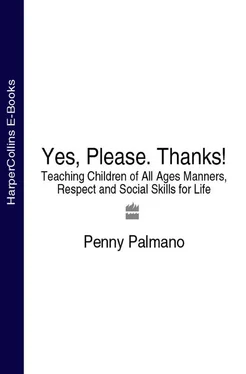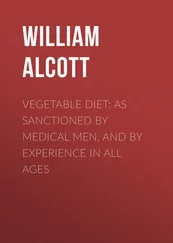The beauty of this book is there is something for everyone and there should be no fixed point at which people reading it need to start. Much will come down to personal preference and the kind of children that you want to raise. However, if good manners and respect still mean something to you, the sagacity of the following chapters will provide you with an invaluable resource as you embark on the most difficult and rewarding journey that any adult can take – namely the fostering of a partnership with your offspring that is abiding and enriching and equips them with life skills that will shape and mark them as worthy individuals.
Keith Young
HEADMASTER
WESTBROOK HAY SCHOOL,
HEMEL HEMPSTEAD, HERTS.
Firstly, I must point out that I am not a child ‘expert’; I am simply a mother who decided that if I was going to have children, they were going to be well-behaved, polite children that I could be proud of.
My experience with other children came from working as a nanny, teaching children to ski and then looking after children while their parents skied at a chalet business I ran with my first husband for six years. The one thing I learnt from all the different children I looked after, including my own, is that all children respond to love and laughter, and to kind, calm and firm guidance.
Call me old-fashioned but I like children to be well-mannered, have good table manners and be polite and respectful. I wanted to have children that I could take out in the knowledge that if we went to a restaurant their behaviour would not give me severe indigestion and apoplexy, even if the food and service did.
My children, like so many these days, did not have the benefit of the traditional Mum and Dad situation as I separated from their father when they were small. So from a young age they had to experience living with their single working mother, moving away from family and friends, changing schools, then a step-father, step-sister, new family, new home, new school, new life. Changes and new challenges just make a parent’s job tougher, but they do not excuse us from teaching manners, politeness and social skills to our children.
Newspapers, teachers, nannies and even grandparents (when they’re not too busy spending our inheritance!) bemoan the fact that children seem to be in control of their parents, and to be honest, in many cases they are right. But strangely enough, little guidance seems to be forthcoming to these parents (who we imagine would prefer it otherwise).
There have been so many conflicting ideas about parenting over the past 40 years that mothers don’t know whether to congratulate their child on being expressive when they pour tomato sauce into their favourite, treasured Gucci shoes or take them for psychological counselling. (Psychological counselling? Surely I mean adoption!)
The word ‘No’ appears to be politically incorrect and is almost obsolete in parenting today. Everything must be discussed. Discuss? With a toddler? Gentle discipline and explanation, yes. But discuss?Has the world gone mad?
I’m not Mother Earth. In fact, when I found out I was pregnant I asked my GP if I could have a general anaesthetic for the birth and suggested being kept under for the next eighteen years. Thankfully, he refused because I would have missed out on eighteen wonderful years and, yes, obviously a few nightmares along the way.
Our children are now 15, 16 and 18 and I can honestly say that they have (mostly) been a joy to have around – loving, funny, polite, very well-mannered, respectful and popular with their own and our friends. They help around the house (when asked, not usually voluntarily), though I must mention the time they cleared up after our Christmas party unprompted (after their parents and 50-plus friends had called it a night). What angels. My sister-in-law says they are the bench mark that all children should be judged by. High praise, indeed. Perfect? Of course not! They don’t keep their rooms tidy and they wouldn’t know how to pick up a wet towel off their bedroom floor if their life depended on it. But in the big picture, does it matter?
Our responsibility as parents is to teach our children discipline, manners, respect and social skills so they will develop into well-adjusted, happy young adults. It’s no surprise that children who are taught these qualities are higher achievers at school, make friends more easily and are more popular with their teachers and other adults.
There are no set rules for bringing up children – how can there be when they are all individual? Bringing up families can and should be fun and I hope this advice will help you enjoy your children to the full. It’s hard to enjoy your children when you’re constantly berating and arguing with them, but it needn’t be that way.
Bringing up children is 90 per cent common sense and 10 per cent struggling through, although there are many, many times when these percentages seem to completely swap places! So, I hope this book helps you get started or puts you back on the right track. It will not answer every question or solve every problem but it will help you end up with happy, confident and trustworthy children you can justifiably be really proud of and make your life as a parent much easier and less stressful.
Good luck. It’s worth it!
Everything we buy these days comes with hard and fast care instructions. Whether it’s a pair of knickers or a frying pan we are told exactly how to look after them.
But a child doesn’t come with instructions. We simply leave home one day and return with a small human life which is totally dependent on us for love, food, comfort, education, clothing, a home, and for being brought up to be a well-balanced, well-behaved, well-adjusted, confident individual. WHAT? The responsibility of it all is enough to make any parent break out in a sweat and lay down in a darkened room with a large, nerve-calming drink.
So is it simply good luck if we have well-behaved children who are a delight to be around, or incredibly bad luck that we end up with uncontrollable, rude, disrespectful little ‘horrors’ that are a constant nightmare and embarrassment to us?
Let’s face it, how many times have we thought or said about someone else’s children:
‘Why on earth does she let those children do that?’ ‘Just as long as they don’t bring those ghastly children.’ ‘Did you see the way that child was eating?’
Imagine if these comments were directed at your own children. Now don’t panic, even if you suspect they already have been, and don’t criticize or label yourself a bad parent and accept things the way they are – just address the problem. Get back in control.
The good news is that all children can be brought up to be well-behaved, well-mannered, polite and respectful, regardless of their personality or character. Obviously, all children are different and a very strong-willed child may need a stronger sense of his boundaries than a calmer, quieter child but both can be equally well-behaved and a credit to their parents.
Teaching good behaviour, manners and respect starts almost from day one. The way we are with our children from the very early days will start to form and mould the way they are going to behave. So basically, it’s easier if we don’t let them get into bad habits and then try and correct them. It is so much easier, for everyone concerned, if they learn everything the right way from the beginning, not dissimilar to puppy training.
For example, if we take a puppy to training classes as early as possible, it will learn to walk correctly on a lead, sit and stay when told. But if we don’t train it from an early age, by the time we realize our dog is uncontrollable and we decide to start teaching him, our problems have multiplied tenfold. That old saying, ‘One word from me, and he does as he likes’, can equally be said about some children.
Читать дальше












